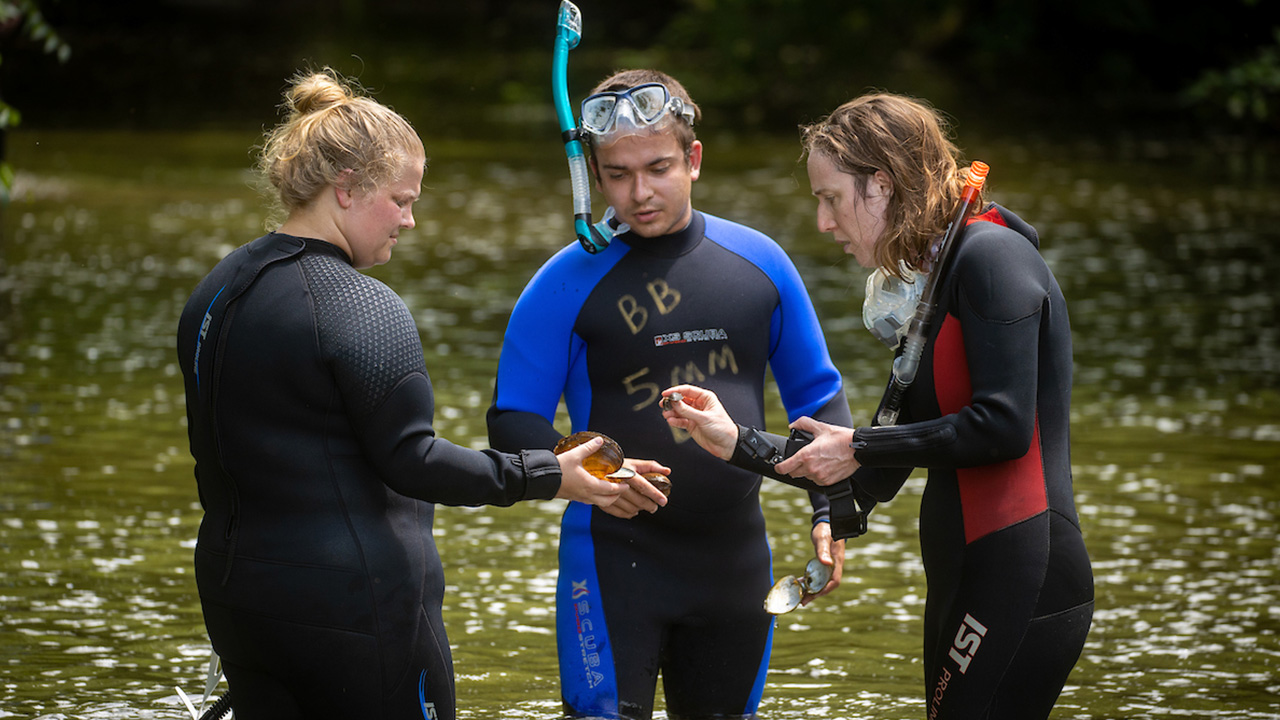
A team of University of Wisconsin-Platteville biology students have been researching watersheds in Southwest Wisconsin to study mussels and the environmental factors that may influence them. They will present their findings in March at the annual Research in the Rotunda event, where they will have the opportunity to share with legislators and other state leaders the importance of these organisms to the ecosystem.
“Mussels impact our lakes and rivers,” said Travis Tucsek, a senior biology and forensic investigation major from Woodstock, Illinois. “They are invertebrates and filter feeders, so they filter and help clean the water.”
Working with Dr. Becky Doyle-Morin and Dr. Kristopher Wright, professors of biology, the students performed three surveys – habitat, water and mussel. The habitat survey included collecting substrate samples, as well as zooplankton and phytoplankton. The students also identified aquatic plants present and documented their abundance. Students surveyed the water by collecting samples from each location and analyzing it in the lab.
“We measured levels of different types of chemicals, like phosphorous and ammonia,” said Morgan Bradford, a junior biology major from Kasson, Minnesota. “This let us see what those levels look like in the overall ecosystem, which can impact the aquatic plants and the mussels living there.”
During the mussel survey, students collected, identified, aged and sexed mussels. The students photographed the mussels they found. While they continue the work of identifying them, they already estimate that they found around a dozen different species, which potentially includes ones that are rare or endangered.
Throughout their research, the students also had the opportunity to volunteer at the National Mississippi River Museum and Aquarium in Dubuque, Iowa, working with the museum’s mussel habitat suitability study.
“This really helped us identify mussels in the field and gave us an overview of how they grow and what impacts them,” said Tucsek.
Volunteering at the museum also gave them an opportunity to work with the public and educate them about mussels.
“A lot of people thought mussels were bad, but after we gave them an overview, they could see they are actually helping us a lot,” said Tucsek.
The students hope to continue educating others when they present at the Capitol in Madison, Wisconsin, on March 9.
“When people hear ‘mussels’ they usually think of zebra mussels, which are invasive and can actually harm the native, good mussels we want in our environment,” said Bradford. “So I’m looking forward to bringing more awareness to the public.”
“When I first jumped into this project, I knew little to nothing about mussels,” added Tucsek. “I feel like a lot of people just think it’s a shell. But it’s really not; it helps make our waterways clean and clear. Mussels are important because they filter the water and create a safe environment for different species. Without them, who knows what would be happening. I hope this will help our legislators to focus more on our waterways.”
For more information on the Research in the Rotunda event, visit www.wisconsin.edu/research-in-the-rotunda/.